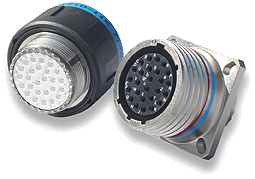Finishes
 MSI's Black Chrome is hard, non reflective, abrasion-resistant, heat and corrosion resistant coating of approximately 0.0002" thickness. Black Chrome is applied after heat-treating and all mechanical operations are performed and may be waxed or oiled to darken the surface. The coating itself provides limited corrosion protection but can be enhanced by adding an underplating such as Nickel. Usually produced to Mil-C-14538C Black Chrome is a dull dark gray in color, almost approaching black and approximately conforms to color plate 37038 of the FSN 595. Steel parts with Rockwell hardness in excess of Rc40 are usually stress relieved by baking before plating, and after plating to avoid hydrogen embrittlement.
MSI's Black Chrome is hard, non reflective, abrasion-resistant, heat and corrosion resistant coating of approximately 0.0002" thickness. Black Chrome is applied after heat-treating and all mechanical operations are performed and may be waxed or oiled to darken the surface. The coating itself provides limited corrosion protection but can be enhanced by adding an underplating such as Nickel. Usually produced to Mil-C-14538C Black Chrome is a dull dark gray in color, almost approaching black and approximately conforms to color plate 37038 of the FSN 595. Steel parts with Rockwell hardness in excess of Rc40 are usually stress relieved by baking before plating, and after plating to avoid hydrogen embrittlement.
 MSI's standard Cadmium finish produces a white appearance with very good corrosion resistance especially with the type II chromate treatment. Typically processed to QQ-P-416F, the type II supplementary chromate treatments can produce iridescent, olive drab, clear and other finishes. Available in classes one and two, MSI's Cadmium finishes are extensively used for corrosion prevention.
MSI's standard Cadmium finish produces a white appearance with very good corrosion resistance especially with the type II chromate treatment. Typically processed to QQ-P-416F, the type II supplementary chromate treatments can produce iridescent, olive drab, clear and other finishes. Available in classes one and two, MSI's Cadmium finishes are extensively used for corrosion prevention.
Plating of composite plastic for EMI shielding and grounding.
 MSI is a leading electroplater to the interconnect industry, providing plated continuous strip and progressive stamped-bandoleer contacts, barrel plated screw machine contacts, and both metallic and composite connector shells. With 12 multi-finish, continuous plating lines and barrel and rack capabilities operating 24/5, and quality certifications to ISO 9001, AS9100, Nadcap-CP, ISO/TS 16949, and FAA Repair Station approvals, MSI provides state-of-the-art electroplating for today’s demanding technology markets.
MSI is a leading electroplater to the interconnect industry, providing plated continuous strip and progressive stamped-bandoleer contacts, barrel plated screw machine contacts, and both metallic and composite connector shells. With 12 multi-finish, continuous plating lines and barrel and rack capabilities operating 24/5, and quality certifications to ISO 9001, AS9100, Nadcap-CP, ISO/TS 16949, and FAA Repair Station approvals, MSI provides state-of-the-art electroplating for today’s demanding technology markets.
Interconnect applications in harsh commercial environments, such as communications towers and exposed outdoor uses, have promoted the use of composite structural plastics for connector shells and fittings. In addition, communications, manufacturing process control, aerospace and medical equipment requiring low or non-metallic signatures have also promoted such uses. The requirement for EMI shielding and grounding in such applications has established the need for high quality, uniform conductive coatings that completely cover the sometimes intricate surfaces of connector receptacles and plugs. These coating have to interface with spring rings and washers for continuity. Composite connector construction has benefited from enhanced corrosion protection with the application of these coatings providing endurance from salt spray exposure frequently exceeding 2000 hours.
MSI’s Electroless Nickel and Electroless Gold finishes provide uniform, seamless, conductive surfaces on composite products manufactured from Ultem poyletherimide (PEI) and many other glass/carbon fiber filled plastics. Chemical or abrasive processing techniques provide excellent surface preparation followed by the coating/plating process.
 MSI's Copper plating is typically processed to conform with MIL-C-14550B and is available in I-IV classes of finish. This durable corrosion resistant process is available in a variety of different finishes, including Bright Acid for a buffing free, bright reflective finish and Cyanide for a dull matte finish. When used as an undercoat, it provides good conductivity properties and an excellent corrosion resistant base for Nickel and other coatings. MSI's Copper plating is frequently used as a mask in surface hardening procedures and provides good lubrication in metal forming operations.
MSI's Copper plating is typically processed to conform with MIL-C-14550B and is available in I-IV classes of finish. This durable corrosion resistant process is available in a variety of different finishes, including Bright Acid for a buffing free, bright reflective finish and Cyanide for a dull matte finish. When used as an undercoat, it provides good conductivity properties and an excellent corrosion resistant base for Nickel and other coatings. MSI's Copper plating is frequently used as a mask in surface hardening procedures and provides good lubrication in metal forming operations.
 MSI's Gold plating produces a good corrosion and tarnish resistant finish with low contact resistance and excellent conductivity and solderability when required. Typically provided to MIL-G-45204C MSI's Gold plating is available in Types I, II, III, Grades A and C and all Classes 0-6. Finishes vary from bright to matte depending on the brightness of the underplating and the Grade and Type of gold used.
MSI's Gold plating produces a good corrosion and tarnish resistant finish with low contact resistance and excellent conductivity and solderability when required. Typically provided to MIL-G-45204C MSI's Gold plating is available in Types I, II, III, Grades A and C and all Classes 0-6. Finishes vary from bright to matte depending on the brightness of the underplating and the Grade and Type of gold used.
 MSI's Nickel plating usually supplied to QQ-N-290A is available in classes 1-2 and grades A-G. This universal coating can be deposited soft or hard, dull or bright and produces visual differences varying from almost white colorations to a heavy metallic, stainless steel like appearances. Corrosion resistance is proportional to thickness and surfaces are magnetic.
MSI's Nickel plating usually supplied to QQ-N-290A is available in classes 1-2 and grades A-G. This universal coating can be deposited soft or hard, dull or bright and produces visual differences varying from almost white colorations to a heavy metallic, stainless steel like appearances. Corrosion resistance is proportional to thickness and surfaces are magnetic.
 MSI's diffused Nickel-Cadmium plating has a smooth dull matte finish and has a color varying gray to black. Typically processed to AMS 2416H, Nickel-Cadmium is used to prevent corrosion of carbon, low-alloy and steel parts. It is not suitable where the minimum thickness of Nickel plating cannot be maintained on complex shapes.
MSI's diffused Nickel-Cadmium plating has a smooth dull matte finish and has a color varying gray to black. Typically processed to AMS 2416H, Nickel-Cadmium is used to prevent corrosion of carbon, low-alloy and steel parts. It is not suitable where the minimum thickness of Nickel plating cannot be maintained on complex shapes.
 MSI's Electroless Nickel plating is a process that deposits a uniform thickness of Nickel onto parts by chemical reduction. This allows complex shapes to be plated evenly and completely. Electroless Nickel offers an excellent corrosion protection and its hardness and low surface friction characteristics make it well suited for bearing surfaces. Electroless Nickel is also widely used by the electronics industries for complex components and conductors. MSI's Electroless Nickel typically conforms to Mil-C-26074 and AMS 2404C.
MSI's Electroless Nickel plating is a process that deposits a uniform thickness of Nickel onto parts by chemical reduction. This allows complex shapes to be plated evenly and completely. Electroless Nickel offers an excellent corrosion protection and its hardness and low surface friction characteristics make it well suited for bearing surfaces. Electroless Nickel is also widely used by the electronics industries for complex components and conductors. MSI's Electroless Nickel typically conforms to Mil-C-26074 and AMS 2404C.
 MSI's Palladium Nickel plating provides a technologically advanced coating that is superior to hard gold, providing greater wear resistance, ductility and thermal stability. It is only offered in reel-to-reel plating. When used for electrical contact surfaces. Palladium-Nickel coatings frequently use a thin gold overplate to further enhance the surface wear resistance and provide greater lubricity.
MSI's Palladium Nickel plating provides a technologically advanced coating that is superior to hard gold, providing greater wear resistance, ductility and thermal stability. It is only offered in reel-to-reel plating. When used for electrical contact surfaces. Palladium-Nickel coatings frequently use a thin gold overplate to further enhance the surface wear resistance and provide greater lubricity.
 MSI's Passivate process conforms to AMS-QQ-P-35 and provides improved corrosion resistance typically on austenitic, ferritic and martenstic corrosion-resistant steels and is available in Types II, VI, VII, and VIII.
MSI's Passivate process conforms to AMS-QQ-P-35 and provides improved corrosion resistance typically on austenitic, ferritic and martenstic corrosion-resistant steels and is available in Types II, VI, VII, and VIII.
 MSI's Rhodium plating provides excellent corrosion resistance and a hardness and abrasion resistance similar to chromium. This metalic, almost stainless steel-like finish can be applied over Nickel, Silver, Gold and Platinum, and with a Nickel undercoat on most other metals. MSI's Rhodium plating conforms to MIL-R-46085B and is available in Types I-II and Classes I-III.
MSI's Rhodium plating provides excellent corrosion resistance and a hardness and abrasion resistance similar to chromium. This metalic, almost stainless steel-like finish can be applied over Nickel, Silver, Gold and Platinum, and with a Nickel undercoat on most other metals. MSI's Rhodium plating conforms to MIL-R-46085B and is available in Types I-II and Classes I-III.
 MSI's Silver plating provides excellent corrosion resistance on most metals, but it tarnishes easily. Replacing gold in many applications requiring good conductivity, Silver plating is usually used in sealed or protected environments. MSI's Silver plating conforms to QQ-S-365D and is available in Types I and II and Grades A and B with Matte and Semi Bright finishes.
MSI's Silver plating provides excellent corrosion resistance on most metals, but it tarnishes easily. Replacing gold in many applications requiring good conductivity, Silver plating is usually used in sealed or protected environments. MSI's Silver plating conforms to QQ-S-365D and is available in Types I and II and Grades A and B with Matte and Semi Bright finishes.
 MSI's Tin plating conforms to MIL-T-10727C and is deposited in varying surface thicknesses. It also offers tarnish resistance. If a bright finish is desired, specify the bright acid tin process. Plated tin processes can achieve greater thickness than with fused tin. The Tin deposit is soft and very ductile, and color can range from matte gray to very bright. Salt spray testing is frequently used to verify corrosion resistance.
MSI's Tin plating conforms to MIL-T-10727C and is deposited in varying surface thicknesses. It also offers tarnish resistance. If a bright finish is desired, specify the bright acid tin process. Plated tin processes can achieve greater thickness than with fused tin. The Tin deposit is soft and very ductile, and color can range from matte gray to very bright. Salt spray testing is frequently used to verify corrosion resistance.
 Inhibit W is a proprietary continuous plating process that combines custom-designed, continuous plating lines with the best of chemical solutions to inhibit both crystalline growth and surface oxidation on pure tin deposits.
Inhibit W is a proprietary continuous plating process that combines custom-designed, continuous plating lines with the best of chemical solutions to inhibit both crystalline growth and surface oxidation on pure tin deposits.
The drive to eliminate lead from electronics has resulted in the use of pure tin (SN) finishes as an economical lead-free plating option. The use of pure tin, however, poses significant risk for electronic systems with the propensity of crystalline growth “tin whiskers” and resulting failure risk.
The whiskers are elongated crystals typically 1mm or less in length and 103 microns in diameter that grow spontaneously. Their growth is unpredictable and may begin soon after plating or years later, producing significant concerns for the reliable operation of electron systems. Short circuits in low voltage, high impedance circuits, and contamination in sophisticated micro-electromechanical products, such as MEMS, from crystalline debris are major concern.
There are no industry-accepted, accelerated test methods designed to judge a particular processes propensity to grow whiskers, resulting with reliance on extensive test and accelerated field trials by major electronic and interconnect companies. Several years ago, successful results by chemical process manufacturers and extensive industry testing has brought process approvals leading to the Inhibit W addition to MSI’s continuous process capability.
Inhibit W is comprised of a combination of unique, state-of-the-art continuous process plating lines with chemical stations designed to both significantly reduce whisker growth tendencies and discoloration through oxidation of the tin deposit after thermal exposure. Inhibit W is typically combined with Nickel and Copper under-plating and with selective Gold and Palladium-Nickel selective finishes.
 MSI's Tin-Lead plating conforms to MIL-P-81728A and offers excellent solderability and good corrosion resistance. Tin-Lead is soft and very ductile, and color can range from a matte gray to a very bright finish. A matte Tin-Lead finish is often used on electronic hardware when solderability is required.
MSI's Tin-Lead plating conforms to MIL-P-81728A and offers excellent solderability and good corrosion resistance. Tin-Lead is soft and very ductile, and color can range from a matte gray to a very bright finish. A matte Tin-Lead finish is often used on electronic hardware when solderability is required.
 MSI's Tin-Reflow plating process reduces the internal stresses that are believed to contribute to the growth of Tin Whiskers.
MSI's Tin-Reflow plating process reduces the internal stresses that are believed to contribute to the growth of Tin Whiskers.
After plating a product with matte tin, the product is then processed through a fluxing agent followed by a series of heat cycles. It is heated to just above the liquidus state (only the tin layer reflows), and is quenched to quickly bring the Tin back to a solid state, thereby greatly reducing Tin’s natural tendency to whisker.
Tin-Reflow Fusing
DID YOU KNOW THAT WHISKER GROWTH IS THE SINGLE GREATEST REPEAT FAILURE IN THE ELECTRONIC INDUSTRY TODAY? AND THAT THE MAIN CONTRIBUTER IS BRIGHT TIN PLATING?
THE REFLOW PROCESS WAS DEVELOPED TO ELIMINATE WHISKER GROWTH. RFC'S GOAL TO MEET GTLO, RoHS, and WEEE, Standards are now available. Whisker growth elimination top priority. The process is cost effective, better than gold, with long shelf life. NO SIGNS OF WHISKER GROWTH on tests to date. The specification MIL T 10727 covers two types of plating and they are not compatible: Pros and Cons MIL-T-10727-1 matte finish "Can" be reflowed; MIL-T-10727-2 Bright Tin "Can Not" be reflowed.
To explain "tin whiskers," we will direct you to a research site by NASA.
| Ring Samples |
Reflow Parts
NASA Whisker Simulation
NASA's Limitations of "Hot Solder Dip" for Tin Whisker Mitigation
|
 MSI's Zinc-Nickel plating conforms to AMS-2417, ASTM B 841 and MSI-143-NoCad specifications and is frequently used to replace cadmium plating. Zinc-Nickel provides more than five times the corrosion protection of cadmium, has greater wear resistance and is an environmentally safe process.
MSI's Zinc-Nickel plating conforms to AMS-2417, ASTM B 841 and MSI-143-NoCad specifications and is frequently used to replace cadmium plating. Zinc-Nickel provides more than five times the corrosion protection of cadmium, has greater wear resistance and is an environmentally safe process.
 Inhibit NC is a MSI proprietary Zinc-Nickel finish that maintains the excellent corrosion resistance of MSI's standard process and provides color options that typically match the olive drab and green to black finishes associated with the Military and Industrial use of Cadmium plating. Inhibit NC provides more than five times the corrosion protection of Cadmium, has greater wear resistance, and is an environmentally safe process.
Inhibit NC is a MSI proprietary Zinc-Nickel finish that maintains the excellent corrosion resistance of MSI's standard process and provides color options that typically match the olive drab and green to black finishes associated with the Military and Industrial use of Cadmium plating. Inhibit NC provides more than five times the corrosion protection of Cadmium, has greater wear resistance, and is an environmentally safe process.